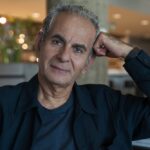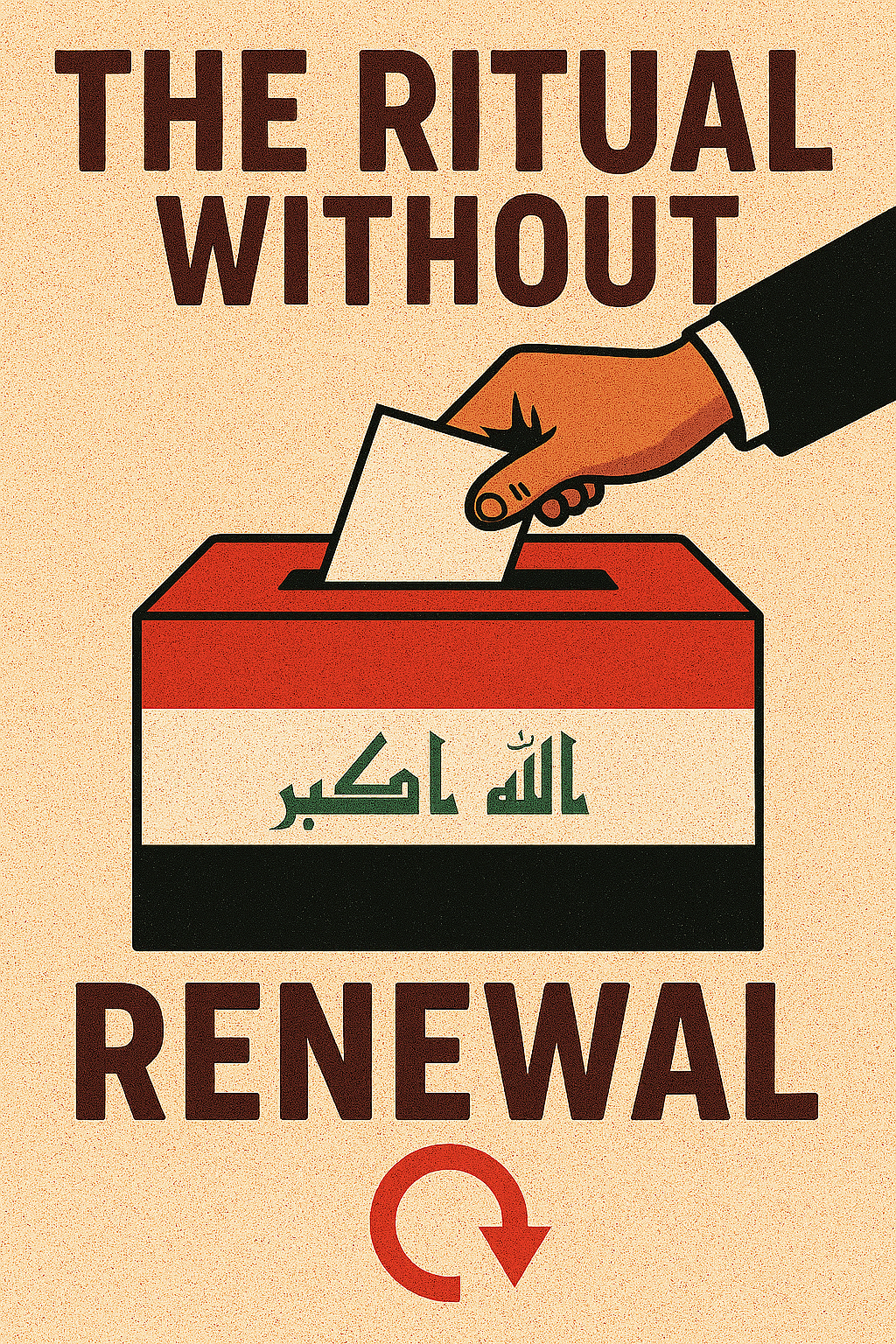The Ritual Without Renewal: What Won’t Elections Change?
Dr Rebwar Fatah
Each vote cast, each promise made—
echoes of change that never arrive.
The cycle continues,
but the soul of the people remains unheard.
Introduction
Soon, residents of the Kurdistan Region will again cast their votes in the Iraqi Federal elections. But what should elections actually change?
In a functioning democracy, elections should renew legitimacy and empower new institutions. A new and effective parliament would exercise full legislative authority; a new government, elected from within that parliament, would serve as the executive branch; and a truly independent judiciary would ensure accountability. Clannish power would be marginalized, and positions would be earned through merit and expertise.
In such a vision, all citizens of the Kurdistan Region would be equal before the law. State institutions—not personalities or party militias—would administer justice. The Region would engage with Baghdad for the welfare of its people, not under external pressure or foreign dominance.
But in the current reality, what won’t elections change?
(1) A Permanent Political Class
The same political elite that has ruled since 1991 will remain. These power holders win without participation; their victory is preordained. Elections merely reshuffle faces in parliament, not power itself. Whatever the ballots say, only two families ultimately win. Elections are a ritual, not a rotation (Reuters, 2024).
(2) Control of State Institutions
Regardless of vote counts, the KDP and PUK will divide the state between them. Each party seizes control of ministries, the judiciary, and the security apparatus. If either loses seats, alliances are quickly struck to retain authority. Thus, the structure of governance never changes—only its decoration (AP News, 2024).
(3) A Divided Territory
The Kurdistan Region remains split between two “statelets”: Barzani’s Erbil and Talabani’s Sulaymaniyah. Neither will yield real sovereignty to the other. Degałe—the steel checkpoint between them—marks not just a geographic border, but a psychological one (Reuters, 2024).
(4) Parliament as Illusion
The parliament serves largely as a decorative mirror—reflecting a false image of democracy to the international community. When it cooperates, it is praised; when it resists, it is shuttered. The KDP rules through intimidation and patronage, and legislative independence exists only on paper (UN Iraq, 2024).
(5) The Border of Power
Even if one party hypothetically won all parliamentary seats, its power would not extend beyond its zone. The KDP’s writ ends at Degałe; the PUK’s authority fades before Erbil’s gates. Each commands loyalty through force, not consent (Reuters, 2024).
(6) A Judiciary Without Justice
The judiciary, rather than serving as a pillar of law, bends to party dictates. Intelligence agencies—Parastin, Zanyari, Asayish, and counter-terror units—exercise power in its stead. Judges, fearful and servile, await orders from political masters. Enforced disappearances, arbitrary arrests, and kidnappings continue unabated, with no intervention by prosecutors or courts (MENA Rights Group, 2025).
(7) Party Militias as State Armies
The KDP and PUK control all armed forces under the guise of the “Peshmerga.” These militias answer to clans, not the state. Institutions remain hollow, dependent on favors from powerful men rather than legal process. The people’s problems are “solved” only through connections (Reuters, 2024).
(8) Ministries Without Authority
Ministries exist only in name. Ministers cannot decide independently; even their decrees require approval from the prime minister or party head. Governance functions as a hierarchy of obedience, not responsibility. Ministers act as clerks, not policymakers (Zagros Centre, 2025).
(9) The Empty Treasury
The regional treasury remains opaque and depleted. The Minister of Finance is unaware of the full extent of revenues and expenditures. Public income is diverted to party accounts. The “drama of salaries” runs parallel to the “drama of drones,” both endless and unresolved (Zagros Centre, 2025).
(10) Unelected Leaders Above the Law
Party leaders—who neither stand for election nor face accountability—retain ultimate power. They discuss strategies, not people’s hardships. They consider the population their followers, not their constituency (Reuters, 2024).
(11) The Geography of Division
Erbil remains closed to opposition figures. Even the Speaker of Parliament or senior PUK officials may be denied entry. Likewise, the KDP’s presence in Sulaymaniyah is reduced to an “embassy.” This physical and psychological division ensures that the dream of a unified Kurdish polity remains perpetually deferred (Reuters, 2024).
(12) A Fragmented Region
Instead of building unity, the ruling parties sustain division as a method of control. They fragment populations along clan, tribal, and geographic lines. This fragmentation serves regional powers—who prefer a weak, divided Kurdistan—more than it serves the Kurdish people (Reuters, 2024).
(13) The Role of Regional Powers
Neighboring states see Kurdistan not as a partner but as a pawn.
Turkey seeks only to suppress Kurdish identity, using both diplomacy and military strikes. Its long history of hostility toward Kurdish autonomy continues (Reuters, 2024).
Iran manipulates Kurdish factions for its own strategic ends, alternating between coercion and co-option. In both cases, Kurdish sovereignty is not respected but traded. The KDP and PUK function, at times, as instruments of these external agendas rather than defenders of their people (Reuters, 2024).
(14) The Role of the Federal Government
Baghdad, for its part, is not a protector of Kurdish rights. Despite constitutional guarantees, it consistently weakens the region through fiscal and political pressure—delaying budget transfers, ignoring Article 140, and failing to address human rights abuses in the region (Kurdistan Human Rights Network, 2025).
The Federal Government’s silence on violations—arbitrary arrests, suppression of free speech, gender-based violence—reveals complicity rather than oversight. It prefers a subdued, dependent Kurdistan to a democratic and self-confident one (Kurdistan Human Rights Network, 2025).
(15) The Rise of Political Islam
The most destructive current of all is political Islam. In its various forms, it has filled minds—especially of youth—with rage, intolerance, and misogyny. It has replaced spiritual ethics with ideological fervor.
Women, the first victims, face daily harassment from organized online armies. Visibility itself becomes a crime. Under such influence, mosques have turned from houses of reflection into pulpits of propaganda.
The region that once produced mystics Al-Shahrazuri, Zain al-Din al-‘Iraqi, Sheikh Maruf Node, Maulana Khalid Naqshbandi, Mahwi, Ala-Adin Sajjadi, and many more; now listens to clerics who declare snowmen haram and claim that jinn inhabit women’s bodies.
Political Islam, inseparable from both KDP and PUK, provides divine cover for temporal power. Religious leaders, hosted in presidential palaces, sanctify corruption in the name of faith. The result: moral regression masked as piety (Reuters, 2024).
(16) Suppression of Opposition Voices
Opposition, whether from within or outside the ruling clans, faces relentless persecution.
Shaswar Abdulwahid, leader of the New Generation Movement, was detained by PUK forces on spurious charges during the 2024 elections (Reuters, 2024).
Shirwan Sherwani, a journalist and activist, continues to face renewed charges under vague security laws (Reuters, 2024).
Lahur Sheikh Jangi, rival to the PUK leadership, was violently arrested in Sulaymaniyah in 2023 amid factional infighting (Reuters, 2024).
Hemin Mamand, a journalist, was shot in broad daylight in Sulaymaniyah; no suspects have been publicly charged (Reuters, 2024).
This pattern—public outrage, promises of investigation, and subsequent silence—reveals a systematic cycle of repression. Both KDP and PUK have reached an unspoken agreement: silence all dissent, whether through imprisonment, intimidation, or exile (Reuters, 2024).
(17) The International Community’s Complicity
Western democracies proclaim support for transparency and human rights but continue to engage only with tribal leaders, sustaining the very structures of corruption they denounce. Their priority is not democratization but geopolitical stability—energy corridors, counter-terrorism cooperation, and containment of regional rivals (MENA Rights Group, 2025).
By negotiating exclusively with the heads of clans, international actors undermine civil society, youth movements, and independent media. Aid and diplomatic legitimacy flow to those most responsible for repression, while reformers are sidelined. Kurdistan is thus kept in a state of permanent dependency: democratic in image, authoritarian in substance (MENA Rights Group, 2025).
Conclusion: The Ritual Without Renewal
Elections in the Kurdistan Region do not herald transformation; they revalidate stagnation. They renew a social contract built on silence, division, and dependency. Parliament serves as a façade of democracy—a theatre for the world stage—while real power remains in the hands of unelected men, armed militias, and clerical ideologues.
.
Democracy, in its true form, is not merely a process. It is a culture, an institution, a commitment to equality and accountability. Until the pillars of party rule, foreign domination, and ideological manipulation collapse, no election can change what has already been predetermined.
References
MENA Rights Group. “Iraq Must Translate Human Rights Commitments Made During Universal Periodic Review into Effective Change.” MENA Rights Group, 2025. https://menarights.org/…/iraq-must-translate-human…
Reuters. “KDP Wins Iraqi Kurdish Parliamentary Election, Commission Says.” Reuters, 2024. https://www.reuters.com/…/kdp-wins-iraqi-kurdish…/
AP News. “Dominant Kurdish Parties Maintain Their Sway in the Election for the Parliament in the Iraqi Region.” AP News, 2024. https://apnews.com/article/2cb4ff56278afc9918bc7b02bf9d882e
UN Iraq. “Statement Attributable to the Spokesperson for the Secretary-General on the Kurdistan Region of Iraq’s Parliamentary Elections.” UN Iraq, 2024. https://iraq.un.org/en/281726
Kurdistan Human Rights Network. “Annual Report – 2024.” Kurdistan Human Rights Network, 2025. https://kurdistanhumanrights.org/…/2025/01/16/kurdistan
Author Profile

- Dr. Rebwar Fatah is a UK-based researcher and MENA expert specializing in political and regional affairs, governance, and media. Passionate about writing, poetry, and photography.
 Social30 January 2026Kurdish Deq is the Power of Seven
Social30 January 2026Kurdish Deq is the Power of Seven Uncategorised30 January 2026The Kurdish Question as a Legal–Political Failure: Selective Humanitarianism and the Erosion of International Law
Uncategorised30 January 2026The Kurdish Question as a Legal–Political Failure: Selective Humanitarianism and the Erosion of International Law Uncategorised26 January 2026Freedom of Expression and Legal Limits under Iraqi and Kurdistan Region Law
Uncategorised26 January 2026Freedom of Expression and Legal Limits under Iraqi and Kurdistan Region Law World16 January 2026Aleppo: A Legal Assessment of Alleged Atrocities in Aleppo
World16 January 2026Aleppo: A Legal Assessment of Alleged Atrocities in Aleppo

